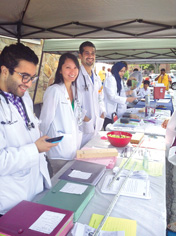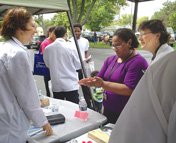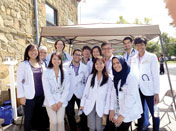Public Health in Flint: Bringing MSU to the Community
- Laura Carravallah, M.D., F.A.A.P., F.A.C.P.
- Associate Professor
- Department of Pediatrics and Human Development and Department of Medicine
- College of Human Medicine

Tarek Yaqub, Serena Zhou, Adiraj Singh, Huda Afaneh, and Bernadene Jayasundera volunteer at a health fair held September 6, 2014, at Our Savior Lutheran, Flint, one of the Partners in Health participating churches.
"If you wait for people to come, they will come later rather than sooner." This statement, made by Dr. Laura Carravallah, refers to the hurdles—such as cost and lack of transportation—often faced by those living in underserved areas when it comes to visiting the doctor's office.

"Preventative medicine gets right back to public health and helps prevent misery before it gets started."
Dr. Laura Carravallah
"A number of people never make it to the doctor's office, in an underserved area," said Carravallah. And since populations in these areas can be at greater risk for various health-related factors, such as diabetes and high blood pressure, the need for public health programs that disseminate preventative information and training is essential. "Preventative medicine gets right back to public health and helps prevent misery before it gets started," she said.
Since the 1960s, MSU College of Human Medicine has partnered with three Genesee area hospitals, including Hurley Medical Center, through the MSU Flint Area Medical Education (MSU-FAME) program. The program provides community-based training to medical students, as well as increased health care access and awareness to Flint-area communities.
Carravallah, herself a graduate of the MSU-FAME program ('89), has a deep love for the Flint community and an equally deep-seated concern for training medical students to be engaged with their communities in culturally relevant ways. "You have to be able to deliver culturally competent care, which includes knowing what environment people face when they go home," she said. "You have to know what to ask."

Meredith Good (center) and Laura Carravallah (right) demonstrate hand-washing techniques to Yvonne Lewis (left) of the Kidney Foundation at the September 6 health fair.
While at Hurley, Carravallah served in many capacities— including director of Hurley Medical Center's Combined Internal Medicine-Pediatric (Med-Peds) residency program, director of MSU-FAME's Core Competency Clerkship, and leader in a number of community organizations—before becoming fully employed by MSU this fall. Throughout these roles, she has been a persistent advocate for health care access for the underserved, as well as a role model for many of MSU-FAME's third- and fourth-year medical students and Hurley's residents, helping them find ways to participate in the communities in which they may someday serve.
Partners in Heart
Carravallah helped coordinate several collaborative outreach activities with Flint communities, including Hurley's Partners in Heart, a self-sustaining partnership with churches in Flint through which health professionals and students train church members to screen for high blood pressure. These members then train other church members, with the goal of helping those with high blood pressure gain information about cardiovascular risks, and if necessary, seek treatment.
"We designed it so the health professional would train church volunteers about [measuring] blood pressure and the importance of it," said Carravallah. "We gave them blood pressure cuffs, guidelines, educational and tracking materials, and we trained them."
Kay Taylor, Ph.D., director of Hurley's Research Center, designed the research component and helped guide the project through its review by Hurley's institutional review board. Taylor also oversees training in the churches, which involves students, residents, and volunteers. According to Taylor, the students serve in various capacities to help with the training. "Sometimes they are the observers, watching as the monitoring is being done," she said.
According to Carravallah, pastors in the area approached Hurley to collaborate on putting together the initiative. The group of pastors, originally representing 10 churches, was headed by Superintendent Quintin Marshall, founder and pastor of New Life Tabernacle Ministries.
Marshall worked for a year to secure funding for the initiative before he approached Hurley. "Then I went to a luncheon with Hurley," he explained, "and they said, "We'd like to partner with you." So they put blood pressure kits into the churches and we started monitoring and sending reports back to them."
Prior to being approached by Marshall, Hurley received funding from an anonymous donor who had an interest in kidney health, for which hypertension (high blood pressure) is a risk factor. According to Taylor, "The churches also had an interest in blood pressure, so we asked the administrators if this would work, and they said OK."
A Recent Community Event with a Partners in Heart Church
Hurley Med-Peds Residents and MSU-FAME medical students joined hands to help screen and counsel community members at Our Savior Lutheran Church this past September. Our Savior has a long history of a strong community health outreach ministry, and has reached thousands of community members through their annual health fair.
This year, Drs. Amani Hassan (Med-Peds resident) and Meredith Good (Med-Peds resident and 2014 College of Osteopathic Medicine Flint campus graduate) were responsible for organizing the Med-Peds Residency's traditional "ask a doctor" booth, which helps patients interpret the screening results that they got at some of the preceding stations. With the help of Hurley Diabetes Center Director Michele Bernreuter, we were able to help screen for blood pressure and blood sugar, as well. We put out a call for volunteers and had so many students reply that we had to turn some away—for fear of them not having enough to do! We promised them more opportunities in the near future!
~Laura Carravallah
Hurley provided detailed guidelines for the church aides
Hurley provided detailed guidelines for the church aides
| Systolic Blood Pressure
|
|
Diastolic Blood Pressure
|
Recommendations (include Healthy Lifestyle for ALL)
|
Category
|
| 100-120
|
and
|
< 80
|
Healthy lifestyle:
- Healthy diet
- DON'T SMOKE
- Control weight
- Follow-up with your doctor regularly
- Exercise regularly
|
A
|
| 120-139
|
or
|
80 - 89
|
Recheck BP within a month
- If BP still in this range, schedule an appointment with primary care doctor within 1 month
|
B
|
| 140-179
|
or
|
90 - 119
|
Recheck BP now – follow checklist for member preparation
- Take BP pill if today's dose missed
- If BP still in this range, schedule an appointment with primary care doctor within 1-2 weeks
|
C
|
Results
- 240 church members completed a pre-intervention
knowledge and attitude survey.
- 47% definitely thought they might be
at increased risk for hypertension.
- 84% thought they could make lifestyle changes
to improve their blood pressure.
- 538 total blood-pressure screenings over the
six-month pilot period.
- Members screened: 263
- Members screened more than once: 90
- Members WITHOUT diagnosis of hypertension with BP in higher range more than twice: 60

Laura Carravallah with MSU-FAME students and Hurley residents.
Marshall believes that previous partnerships with MSU Extension (MSUE), which increased health capacity through nutrition-related classes, helped to "seal the deal" with Hurley. "These classes were part of the whole package that we presented to Hurley," said Marshall. "MSU has been a good partner with the nutrition and cooking classes, and we want to keep going on with these programs. You have to keep doing repetition; otherwise we won't get them energized to keep going on the program."
Keeping his church members energized on this issue is a high priority for Pastor Marshall, who is concerned about both their spiritual and their physical well-being. He is personally aware of the serious health concerns in his community. "In the black community, hypertension is a serious problem," said Marshall, who is himself undergoing dialysis because of blood pressure. "This has been a catalyst for getting our people to look at this issue. Some people don't know they have high blood pressure."
For Marshall, maintaining a strong partnership with MSU is an important aspect of the initiative. "I would like to continue that relationship with MSU to bring better health to the community," he said. "If we work together, we can make it happen."
Working together, the partners have helped the project expand from its original 10 churches into 20 churches, and according to Taylor, the churches also want to expand the project's focus.
"They said we need to do other things, such as screen for diabetes with blood glucose tests," she said. "This will take more supplies and more money, so we have a grant application out, and are waiting to hear whether it will come through."
Carravallah believes a key factor in the program's growth is that the churches don't need constant supervision from the health professionals. "The beauty of it is they didn't need us anymore," said Carravallah. "We developed a sustainable program not dependent on the health care professionals."
The Public Health Certificate Program
Now that she is working directly for MSU's College of Human Medicine, Dr. Carravallah has been tasked with creating and directing a Public Health Certificate Program for medical students placed in Flint. Her goal of preparing medical students to be engaged within communities remains strong. "For physicians to be effective, they need to get out of their examining rooms and get to know the people they're working with," she said.
Funded by the Mott Foundation as part of the expansion of public health in Flint, the certificate program will boost MSU's outreach to Flint communities. MSU's overall public health focus in Flint will also draw national-class researchers from many disciplines, such as epidemiology, biostatistics, environmental health, health policy, and health education, which, according to Carravallah, "presents an opportunity to bring a lot of different perspectives to bear."
Working on the Public Health Certificate Program expands her commitment to student and community involvement, while deepening her roots in the college. "I come from the College of Human Medicine. I believe in its human service element, and it's really exciting to continue this," explained Carravallah. "I have a strong resonance with MSU's commitment to the community. You can't effectively teach these things without coupling them with community service."
While her goal is to inspire medical students to become engaged with their communities, she is equally inspired by them. "The students come from all areas, and they feel called to this work. They bring different perspectives and an enthusiasm that brightens things up!"
A New Location in Flint, Michigan
As part of its plan to expand its medical education and public health programs in Flint, the MSU College of Human Medicine moved into its new facility in the former Flint Journal building this fall. Dr. Carravallah has an office located in this facility, which also houses the MSU-FAME program, the Leadership for the Medically Underserved Certificate program, and the newly hired public health researchers. Approximately 100 of MSU's third- and fourth-year medical students will begin using the building in the spring.
- Written by Amy Byle, University Outreach and Engagement